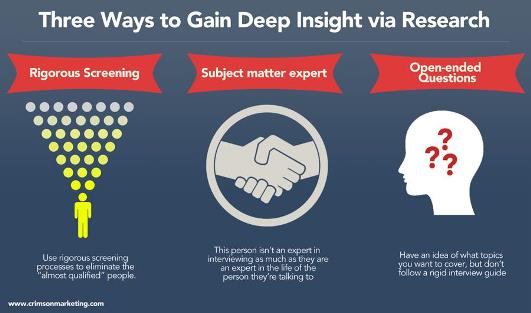If you are a marketer, you need to understand everything you can about your market. To do that, you first need to understand market segmentation, competitive strategy and overall strategy. A key component of this is market research. The market research is easy. Gaining insights from that research is hard.
Your job is to find out as much as you can, gain insights about your customers and figure out what to do with those insights. The best market research tool you can use to get a look inside your customers’ heads is the in-depth interview.
A lot of researchers rely on driving the costs of research down to get as many data points as they can — cheaply. This kind of data can be interesting, but it is not all that helpful in making strategic marketing decisions.
The better solution is to focus on fewer data points but acquire data that is as in-depth as possible.

The in-depth interview is hard to do well, but the benefits make the effort worthwhile. Some of the reasons the in-depth interview is difficult to conduct are as follows:
- You need to talk to the right person. Use rigorous screening processes to eliminate the “almost qualified” people. You’ll usually reject more candidates than you accept into your interview process.
- A subject matter expert must do the interview. This person does not need to be an expert interviewer, but he or she should thoroughly understand the interviewee. The perfect interviewer for an in-depth interview is often someone who used to have the same job as the person he or she is interviewing.
- You should know which topics you want to cover, but don’t follow a rigid interview guide. This is the ultimate secret to gaining insight. The interview guide should only be an entryway to exploring a topic and should allow the interviewee to take it where he or she wants to take it. To do that, the interviewer must ask open-ended questions.
For example, when you ask systems administrators about their “care abouts,” they start talking about staying within their budget, making sure installation and management is easy and reducing support calls.
But when you probe deeper, by asking open-ended questions, you discover that the thing they care most about is that the product never fails. But you only discover this very important point if you set up a dialog and really listen to what they say.
One way to get to this kind of information is to encourage interviewees to tell you stories. The best way to get them to tell stories is to empathize with their specific situation and to keep asking them questions about it. If you have a domain expert asking the questions — someone who’s “been there” before — it’s easy for him or her to get interviewees to drill down on their real pain points.
In one real-life example, the interviewer was able to probe deeply enough into the circumstances surrounding a product glitch that she discovered the interviewee (a system administrator) now hated the vendor because, due to the failure, the interviewee had been forced to work an entire weekend when he was supposed to go on a fishing trip. The product glitch, a relatively minor issue in the eyes of the vendor, became a huge issue for the sys admin (a key decision influencer). The interviewer only discovered this because of the open-ended nature of the interview.
The standard interview approach is to create an interview guide; and this, by its very nature, limits exploratory questions. The in-depth interview, by contrast, features a lot of open-ended questions like “Why?” or “Tell me more,” or “How did that happen?” or “What would happen if ….”
Through in-depth interviews, you can gain much deeper insights into the issues that are not thought of when you develop your questionnaire but are only found through true dialog with your market. If you get the right person talking to the interviewee, and you encourage him or her to explore issues beyond the interview guide, the key insights will emerge.
After all, it’s the insights you are looking for, not the data.
Glenn Gow is founder of Silicon Valley-based Crimson Marketing. He is an expert in marketing strategy for tech companies, especially in digital marketing, demand generation and social (selling and marketing). Follow him on Google+ or Twitter at CrimsonCEO.
